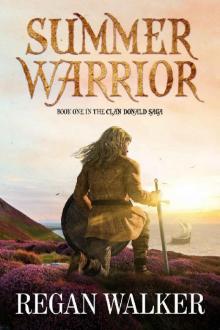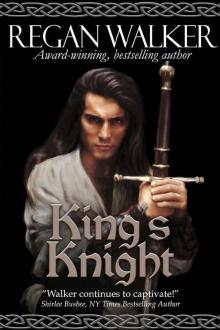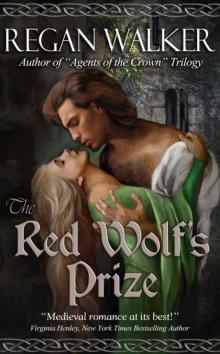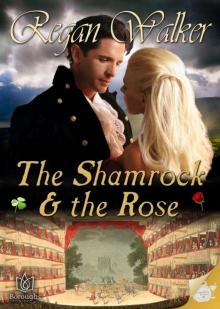- Home
- Regan Walker
Summer Warrior (The Clan Donald Saga Book 1) Page 4
Summer Warrior (The Clan Donald Saga Book 1) Read online
Page 4
Olaf sat back in his chair, twisting his silver chalice in his hand, the rubies flashing red in the candlelight. He considered the abbot’s news. He had never been one to encourage close ties to Norway, though he paid King Magnus homage. He preferred his alliances with England, Galloway and Scotland. They were closer and stronger. In precarious times, they had assured none would threaten his rule. Still, there was this Norse pirate menace to deal with. It might be wise to make an ally of this Somerled. “Will he come, do you suppose?” He was curious to meet this warrior who had risen from nothing to be the talk of the night fires and the chatter of priests.
The abbot returned him a knowing smile. “He will come, Sire. How could he refuse an invitation from the powerful King of Man?”
RAGNHILD TRIED NOT TO LOOK at the men in her father’s hall who had come from Orkney but she felt their eyes upon her all the same. Sweyn Asleifsson had been among those accompanying Earl Rognvald when he came before and she had not liked him then. One of the guards told her Sweyn’s companion called him “the Skullcrusher”, a name that, while fitting, made her shiver to think of it. From his belt hung a wicked-looking axe he sharpened each day.
His companion, Holdbodi Hundasson, was like him. Both were only a few years more than a score of summers in age, and yet already they displayed a great talent for drunkenness, consuming much ale from their drinking horns deep into the night. She had listened from the shadows on the circular staircase and learned of their adventures and plundering.
They made free with her father’s female servants and, more than once, the castle guards had stepped in to prevent the Orkneymen from taking advantage of a frightened girl.
Sweyn had the harsher mien. Like the other men in her father’s hall, he wore a beard and whiskers on his upper lip. Yet the lines in his face were deep for his age and the haunted look in his pale eyes seemed to bear witness of evil deeds. His tunic was fine enough, speaking of wealth. On his chest, he proudly displayed a large gold Thor’s hammer, a pagan symbol, yet he served a Christian lord, who, she was reminded, bragged about his skill at casting runes. Worse still, the bold leers Sweyn gave her made her skin crawl. It was as if he were undressing her with his eyes.
Both Sweyn and Holdbodi had the look of pirates, their lank brown hair bleached from the sun hanging in long tendrils. Their eyes were lustful and acquisitive. She wondered how their master, so meticulous with his person, tolerated such a slovenly appearance in his warriors.
She had not liked the vain Earl of Orkney but she liked even less these men who purported to speak for him. She only hoped, having conveyed their master’s message of his delay, they would soon be gone.
STANDING IN THE PROW of his longship, Somerled watched the Isle of Man grow larger as they sailed nearer to the coast. All around him, the setting sun had turned the sky the color of orpiment, the flame-colored mineral whose poison archers used to render their arrow tips deadly. Where the sun met the sea, the bright color faded like dying embers.
The ship he sailed was one he had captured from the Norse raiders that had attacked the Isle of Mull, now refitted with a hinged stern rudder and plain stem posts. Larger than his fast-moving galleys that carried sixteen oars and thirty men, the twenty-bench longship carried forty or more.
Word had spread of the successful uprising he was leading in Argyll and the Southern Isles, causing men to flock to him in great numbers. Some had lost all to the Norse and cried for vengeance while others wanted to be a part of what had begun in Morvern. Somerled was pleased to see the spirits of the villagers rise with their victories.
He now had more than thirty longships and galleys under his command and, with each battle fought and won, he gained more. With them, he had taken back much of Argyll, including Kintyre and Lorne, and the people now addressed him as “Lord”.
“Are we expected?” asked Angus, staring at the white limestone castle silhouetted against the salmon-colored evening sky.
“Aye and no,” said Somerled, amused at the situation. “We are invited but I sent no message as to when we might call upon the king. Nevertheless, I assume we will be welcomed, particularly with Maurice at my side.”
Maurice MacNeill, who joined Somerled after Morvern, had been a foster brother to King Olaf while he was still living in Dublin. Somerled hoped Maurice’s presence would make the meeting go easier, a gathering of friends, not strangers.
As they entered the crescent harbor, the King of Man’s longships closed in behind them, sealing off their exit. It was what Somerled would have done had he commanded Man’s fleet. He had expected the move, hence he did not take offense. A dozen of his own longships remained on the coast just outside the harbor as a precaution should a fight ensue as he tried to leave. Invited guest or no, he would be prepared.
At the pebbled shore, they beached the three longships alongside a dragonship already there. The Norse warriors standing on the deck studied Somerled and his men in curious fashion, the unique rudders drawing their attention.
The round shields of Somerled’s men carried different designs than those of the Norse and their clothing was Gaelic. Had they met on a distant shore a battle might have ensued but Somerled had come to visit the King of Man.
He turned to Domnall, now a senior captain in charge of ships and men. “Some of the men can bed down on the beach; the others should remain onboard.” With a look toward the dragonship, beached nearby, he added, “I trust not the Norse, even invited ones.”
Domnall nodded. “Aye, Lord.”
Somerled, his brother, Angus, and Maurice headed toward the castle. Beneath Somerled’s boots, the dry grass crackled with his footfalls. The hillsides, once green with summer, now wore the rich brown mantle of autumn.
He and his companions scaled the small hill from the harbor to the wooden palisade that surrounded the tall stone fortress with its crenelated top and numerous arrow loops. The battlements were manned by warriors in helms and hauberks. King Olaf did not leave his peace to chance.
“It has been a long while since Olaf and I were foster brothers in Dublin,” said Maurice, “yet, despite the years, I expect he will know me.”
Somerled glanced at Maurice, judging him to be in his fourth decade, somewhere between his own age and the King of Man’s. “I am hoping Olaf will be pleased by your presence and his welcome all the warmer for it.”
“Aye, he will be glad to see me,” said Maurice. “We were unruly lads together and said our goodbyes on good terms. I was younger and looked up to him. Which reminds me, best be prepared for his short height. ’Tis the reason he was dubbed ‘Bitling’ as a youth.”
It was difficult for Somerled to think of such a powerful king as a man of small stature. The image he had conjured, particularly after seeing the Princess of Man, was quite different. “His lack of height does not seem to have impaired the respect he has garnered as a king among kings.”
Maurice shook his head, the light from the setting sun making his face glow. “Nay, it has not, though he generally leaves the fighting to others. He was trained to use a sword, but he is no warrior. His strength lies in diplomacy.”
They crossed the bridge over the moat and approached the gate to the wooden palisade where a guard in hauberk and helm stood, lance to hand.
Uncharacteristically, Somerled was anxious. It had nothing to do with the guard or meeting the king. Two years had passed since he’d first glimpsed the red-haired princess. Did she still remain unwed? The thought that she might now be the possession of another did not sit well. The pleasures of women were not unknown to Somerled but none compared to his memory of the girl tearing across the green hills of Man on a magnificent white horse. He had hoped then their futures might somehow be entwined and that hope still lived.
Somerled had enriched his clothing for the occasion. He wore a crimson tunic embroidered with silver thread and a mantle of fine wool in a deep shade of blue. Clasped at his throat was an intricately carved silver raven brooch with a ruby eye, a gift from his Norse m
other. Yet, as he intended, there was much of his attire, including the Celtic embroidery on his tunic, that proclaimed him a Gael. Proud of his heritage, he would not seek to hide it, not even for a Norse king.
At the gate, the sound of merrymaking reached his ears. Beside him, Maurice announced to the guard, “The Lord of Argyll, Kintyre and Lorne would see the King of Man, having received his invitation.”
“Wait here,” said the guard who carefully perused the three of them before stepping through the gate and closing it behind him.
Moments later, he returned to open wide the gate. “The king bids you and those with you welcome, Somerled.”
So, Olaf did not choose to recognize his title. Well, that would soon change.
RAGNHILD LOVED HARVEST time when hearts were merry and food was plentiful. Now that the hard work was done, there was time for celebration and dance. Except for the high table where her father and Affraic still sat observing all, the trestle tables had been taken down and stored against the walls to allow room for dancing. She anticipated this part of the evening with eager delight, for she loved the many forms of dance visitors had brought to Castle Rushen since she was a child.
The music had just changed to the circle dance and Ragnhild was joining hands with the others when the doors to the great hall opened to admit three men. They paused before striding toward the high table. The hounds resting near the hearth raised their heads but showed no alarm.
At her father’s signal, the music stopped. “It seems we have a late addition to our celebration.”
The tall, fair-haired man in crimson tunic and blue mantle bowed before her father. He was lean and his movements agile. His hair, shining in the light of the torches, was long to his shoulders. His prominent jaw was outlined by a trimmed copper-colored beard. Her first impression named him Norse, yet his clothing spoke of a Gaelic connection.
Rising, he said, “I come at your invitation, good king. I am Somerled, Lord of Argyll, Kintyre and Lorne.” There was the hint of a lilt in his accent. His voice was clear and deep, the voice of one who knew his own worth but was neither proud nor boastful. She sensed an underlying strength that belied his humble stance before her father. Could this be the one Abbot Bernard had spoken of?
Somerled continued, “Allow me to introduce my brother, Angus MacGillebride, and my companion, whom you may recognize as your foster brother, Maurice MacNeill.”
Her father was already smiling at the Irishman who appeared a Celt in green and brown, his curly dark hair shorter than that of the other two, his skin swarthier. The one called Angus, Somerled’s brother, was dressed as a Gael, his hair slightly darker than his fair-haired brother.
Ragnhild was intrigued.
Her father nodded to the one called Maurice. “Many years have passed since we lifted cups of mead together in Ireland. I am glad to see you have gone far and stand before me a fine man.”
“You flatter me, my brother, for it is you who has gone far.”
Her father’s smile was wide. “Who would have thought the King of Dublin’s youngest son would have risen to be a king himself?”
“Fate, my lord,” suggested the one called Maurice, “and the will of King Henry, God rest his soul.”
Her father laughed. “You speak truth.” Then, turning to the golden-haired one, he said, “You are welcome in my hall, Somerled. I have heard much about your conquests. There is room at the high table for the three of you. Come, sit beside me and share your tales while the music and dance resume.”
As the three men approached the high table, Ragnhild, not wishing to be left out of the introductions, walked to the raised dais and gave her father an expectant look.
Her father chuckled. “I must not forget to introduce my ladies.” He gestured to Affraic on his right. “Allow me to present my wife, Queen Affraic, daughter of the Lord of Galloway.” He did not mention that Affraic’s mother was one of King Henry of England’s many bastards.
The queen smiled but there was no warmth in her greeting.
“And my daughter,” said the king with a sweeping gesture, “Princess Ragnhild, the jewel of Man.”
Her father did not see the grimace that came and quickly went from Affraic’s face but Ragnhild, expecting it, had taken in the expression and knew its source was jealousy. Her father had given her the byname when she was but a small child. Affraic, being close in age to her stepdaughter, chafed at the description.
The visitors, who had paused at her father’s words, bowed to Affraic and then to Ragnhild. The eyes of the golden one were clear blue and piercing in their intensity as he faced her. “I have heard much about you, Princess, and have longed to meet you.”
She felt the heat of her blush at his words. Studying his face for only a moment, what she saw there was sincere, unclouded interest. “I am happy to welcome you, your brother and your friend to my father’s court, my lord.” She gave the visitors a brief curtsey before returning to the dancers.
What had he heard about her and from whom?
OLAF HAD NOT EXPECTED Somerled to look the part of a nobleman, his posture erect and his clothing fine. He carried himself as one born to wealth, not a man who hunted pirates. His steps, too, were measured and his voice one of authority. About him was an air of greatness Olaf had observed in few others and it made him wonder what might be the fate of such a one.
So, this foreign Gael was now Lord of Argyll, Kintyre and Lorne, was he? Mayhap it was by his own pronouncement but, nonetheless, if the Gaels in the Highlands and Ireland supported him and he could send the Norse running, Somerled was one step short of being a king.
The three men joined Olaf on the dais. Their goblets were soon filled with the rich red wine Olaf favored. “Might you be interested in some food?” he asked them.
Somerled shook his head. “We have only just dined.”
Olaf asked, “Well, perhaps some cheese and bread?”
“Thank you,” Somerled said. “Some bread and cheese would suit.”
It occurred to Olaf the young lord’s request for food to accompany the wine was driven not so much by hunger as by the desire to preserve his wits in the midst of a strange court. For that, Olaf admired him. It was the first lesson learned by a young man destined to rule. Only fools were governed by drink.
Olaf gave the order to bring bowls for washing their hands and then for food and some sweetmeats. “Have you known my foster brother long?” he asked Somerled with a wink at Maurice.
“Since Ireland,” offered the young lord, “where I spent my youth.”
“Somerled trained with my young warriors,” said Maurice, “quickly rising above the others. Once I’d heard of the victory at Morvern, I offered him my sword.”
“Morvern in Argyll?” Olaf asked. “Tell me.” As the food was delivered and the men began to eat, Olaf leaned forward eager to hear more.
Maurice launched into a description of a battle won by a subterfuge Somerled had conceived that challenged one’s belief. But, if it occurred, it had been an ingenious strategy by a brave young man outnumbered by stronger and more numerous Norse raiders.
The tale having ended, Maurice said, “’Tis all the men speak of. And, since then, Somerled has led us to victory in each battle fought. The Norse pirates now fear his strategies as much as his might.”
The two men with the young lord went on to describe other battles with the Norse in Argyll and the Isles. Throughout the telling, Somerled remained silent, though occasionally his expression spoke of amusement. Often, the young lord’s gaze drifted to the dancers whirling about the hall and to Ragnhild where she danced in a circle with others.
Olaf was not surprised. His daughter’s beauty and lively manner attracted many men. The Earl of Orkney was not her only suitor.
Listening to Maurice with one ear, Olaf had heard enough to persuade him. “How many ships do you now have, Somerled?”
Shifting his gaze back to Olaf, he said, “Thirty, my lord. Three are beached at the edge of your harbor and anoth
er dozen are anchored without. The rest await me off the coast of Kintyre or remain farther north in Argyll. I do not keep them all in one place.”
“A goodly number,” said Olaf, impressed. “The least I can do for your men in the harbor is to feed them from the richness of our harvest.” Olaf turned to give the order that would see it done.
“They will be most grateful,” said Somerled.
“With your success in the north where I have interests,” said Olaf, “it seems prudent for us to speak of an alliance.”
Somerled’s eyes narrowed, the blue growing more intense. “An alliance would be of interest to me.”
“Very well,” said Olaf. “Be my guest this night. Enjoy the celebration and my hospitality. My daughter will see you have chambers in the castle. On the morrow, as you break your fast, we will speak more of this.” Olaf got to his feet and offered his hand to Affraic. “Come, Wife, let us leave the hall to those who would continue the celebration. Just now, I would seek my bed.”
Somerled rose and bowed, his companions following his example.
Olaf turned to go. Over his shoulder, he said to Somerled, “You might wish to partner in a dance with my daughter. She is well accomplished.”
“It would be an honor,” replied Somerled. As the music changed, Olaf paused to watch the young lord set aside his mantle and stride to the middle of the hall to bow before Ragnhild. He did not hear what was said but the princess smiled and nodded.
Olaf ascended the stairs, thinking his daughter would enchant the young lord as she did most men. So much the better for what he had in mind.
“Surely you do not intend to give the princess to an upstart foreign Gael?” asked Affraic in that nagging tone he disliked.
“No, of course not. But, if I can, I would have his ships and his warriors at my beck and call.”
CHAPTER 5
RAGNHILD THOUGHT PERHAPS she should not have had that last goblet of her father’s best wine. But mayhap her lightheadedness was due more to the company of Lord Somerled, for he was fine to look at, an adroit dancer and courtly in his manner.

 Summer Warrior (The Clan Donald Saga Book 1)
Summer Warrior (The Clan Donald Saga Book 1) Echo in the Wind
Echo in the Wind Once Upon a Christmas Past
Once Upon a Christmas Past A Secret Scottish Christmas (Agents of the Crown Book 4)
A Secret Scottish Christmas (Agents of the Crown Book 4) The Holly and the Thistle
The Holly and the Thistle Racing with the Wind (Agents of the Crown)
Racing with the Wind (Agents of the Crown) Wind Raven (Agents of the Crown)
Wind Raven (Agents of the Crown) Rebel Warrior (Medieval Warriors #3)
Rebel Warrior (Medieval Warriors #3) King's Knight (Medieval Warriors Book 4)
King's Knight (Medieval Warriors Book 4) The Twelfth Night Wager
The Twelfth Night Wager The Red Wolf's Prize
The Red Wolf's Prize The Shamrock & the Rose
The Shamrock & the Rose A Fierce Wind (Donet Trilogy Book 3)
A Fierce Wind (Donet Trilogy Book 3) Against the Wind (Agents of the Crown Book 2)
Against the Wind (Agents of the Crown Book 2)